Time is precious, especially when you’re an overworked student. So we’re going to count down my top 12 time management hacks and tips for students, to help you get the most from the time that’s available to you each day. I promise, these tips will help you get your work done and still have time to relax and sleep at night.
Make the most of these tips and you’ll soon move from “there are never enough hours in the day” to “no more all-nighters for me”!
Prefer to listen to my top time management tips? This article is also available as a podcast:
Before we dig in, here’s a quick summary on:
Why time management is important for students
The reality is, in our fast paced, technology driven world, proper time management skills are increasingly important for students who wish to succeed and minimise stress.
So what is time management? Put simply, the ability to plan and regulate the amount of time you spend on different tasks (such as homework and revision), and then follow through with that plan.
For example, that means setting out to get all your homework done between 6 and 8pm this evening, so that you can go play football with your friends, and then sticking to that plan!
Why is time management important? Well, let’s review a few key points:
Learning to manage your time means learning other important (transferrable) skills:
- Prioritisation and delegation
- Short and long-term goal setting
- Self-reliance and praise
- Effective organisation techniques
- Efficient study (and working) techniques
Plus, once you learn to manage your time, you’ll find that:
- Your attention is more focused when you’re studying
- Learning is more engaging (especially when you know it won’t drag on forever)
- Less time is wasted on distractions
- You’re less stressed (ticking off a to-do list feels amazing, trust me!)
- Your sense of achievement stems from yourself (as well as praise from others)
- AND you have more free time to enjoy the activities you love
Sounds like a win-win-win, am I right?
What’s more, learning these skills as a student will not only help you manage your revision schedules and exams, but is certain to improve your work-life balance and coping abilities once you make the transition from school to university and the working world! (Time management is really desirable skill for employment.)
So let’s get stuck into counting down my top 12 time management tips and hacks for students:
Tip 12: Unplug
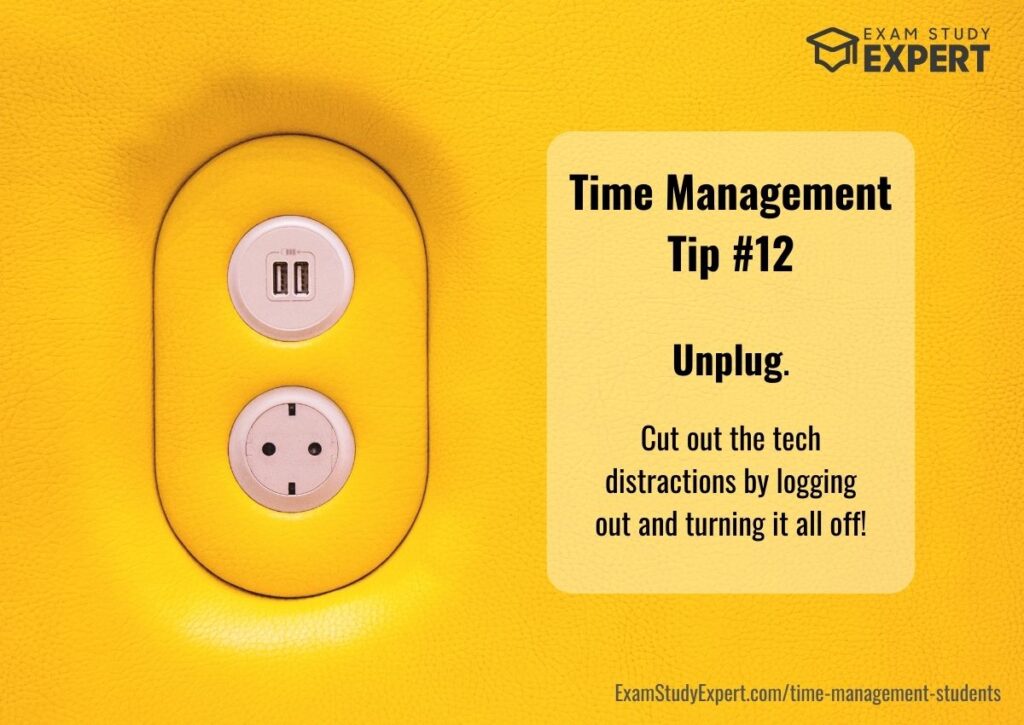
Turn off the phone. Log out of your emails. Turn off the Wi-Fi on your laptop. In fact, turn the whole laptop off if you can!
My first time management tip for students, and the first step to making the most of time is:
Making sure the time you have available for work is actually, well, available for work, not spent fielding a stream of pings and notifications and interruptions.
So cut out all the tech distraction you can. If you’re able, try going somewhere where there won’t be so many human distractions, like a library. (Plus that studious atmosphere makes for great focus!)
Tip 11: Batch
You can save a ludicrous amount of time by doing certain (non-essential) tasks less frequently – that’s called “batching”.
My favourite examples are all classic chores: email, laundry, cooking, washing up and shopping.
Here are some examples for how to get batching on smaller tasks to free up your time:
- Check your email once per day, max, when you’re busy. Deal with it all in one go. It’s way more efficient than checking multiple times through the day, trust me.
- It’s the same principle for messages in general – try and train your friends and family into not expecting instant responses from you on WhatsApp, Snapchat or whatever you use to keep in touch. They should be understanding once you explain how helpful it is for your studying!
- Once per day may be a bit of a shock to the system for some of you on this, but aim for it if you can!
- Chores like laundry and food shopping are another great example. It takes roughly the same amount of time to do 3 weeks’ worth of laundry as 1 weeks’ worth – so if you’ve got sufficient clean clothes in the wardrobe, do it every three weeks rather than every week.
- Leftovers are your friend. If you cook for yourself, make larger quantities of certain meals like soup or pasta sauce, and keep the leftovers in the fridge or freezer for a rapidly-prepared, nutritious meal on future days.
- Less time cooking every day = more time for studying (or relaxation if you’ve finished your homework already!)
By doing these things less frequently, they take up less time overall. Hello free time!
Tip 10: Stack
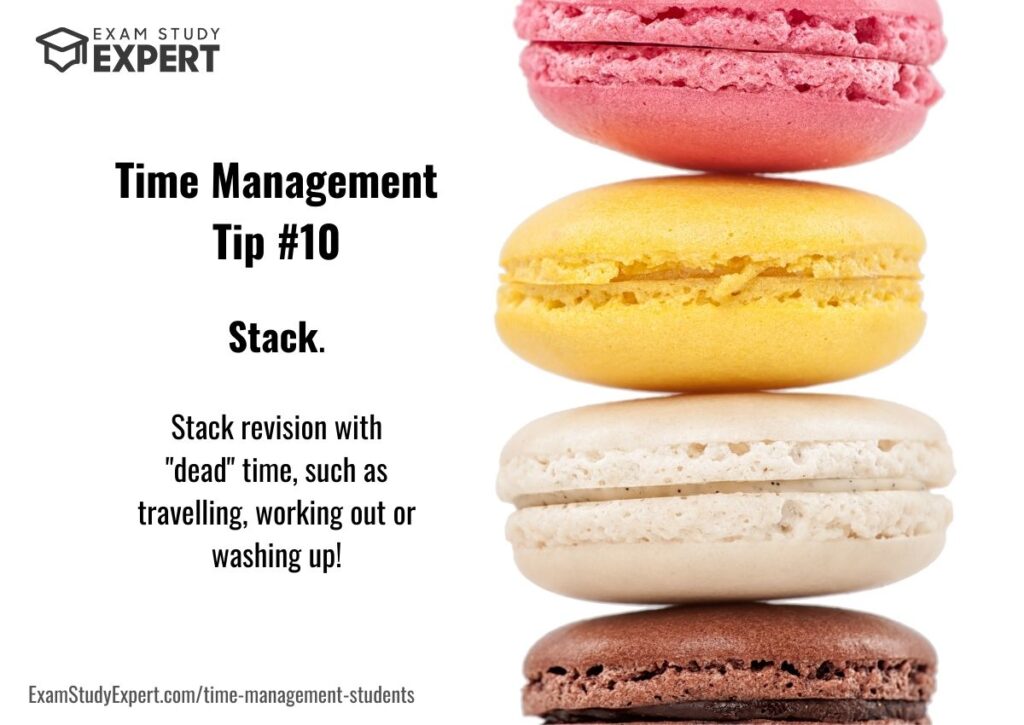
If you can’t batch a task, then consider whether you can stack multiple tasks on top of each other.
There are lots of times when you need total focus on your work, when you want to focus strictly on one thing at a time.
But … there are also times where you can effectively multi-task (and that’s not something I say lightly!).
Look for opportunities to make better use of otherwise “dead” time through the day. Once again, think chores and errands …
How?
- Adding audio is a great method – like listening to helpful study podcasts like the Exam Study Expert podcast, while you’re travelling around, working out, running errands or doing the washing up.
- Alternatively, if you have time waiting for the bus or on the train, can you use an app like Quizlet to practice a few flashcards?
Here’s how I practiced stacking as a student:
When I was revising for my A-levels (that’s senior year of high school for all my non-UK friends), I stuck tables of key data I needed to know around the house, especially in places I paused, like by the kettle for when making a cup of tea, around the bathroom mirror for the time while brushing teeth or shaving, even by the loo.
But having said all that, don’t take it too far, remember my next tip:
Tip 9: Take a break
If you want to make the most of your time over the long run, you can’t book yourself solid from the moment you wake to the moment you go to bed.
You need quality time out to rest, recharge and decompress, so that you stay productive in the time you have available. Trust me, no-one wants to burn out before they even get to their exams!
Whilst it might seem counter-intuitive, this is one of the most important of my time management tips, especially for overwhelmed students!
Check out episode 38 of the Exam Study Expert podcast for lots of helpful guidelines on setting up a good break schedule to keep yourself in tip-top condition to maximise your daily output of productive work.
On a related note, you may find that your need for down-time evolves, particularly as you get closer to big exams, or a major assignment deadline, and your stress levels start to creep up.
In the previous tip about stacking, I mentioned how as a student I put up posters around my house in key locations. So here’s the caveat: that was fine for a while, but as anxiety started to edge up, I found my mental health was greatly improved by taking most of the posters down,so that I could just relax for a few minutes while making tea, rather than stressing about work in every waking moment.
It’s all about finding the balance – yes, I want you to use your time well, but you’re not a robot, you need time to recharge your batteries else they’ll run flat. So go enjoy that mug of tea!
Tip 8: Maximise your “prime time”
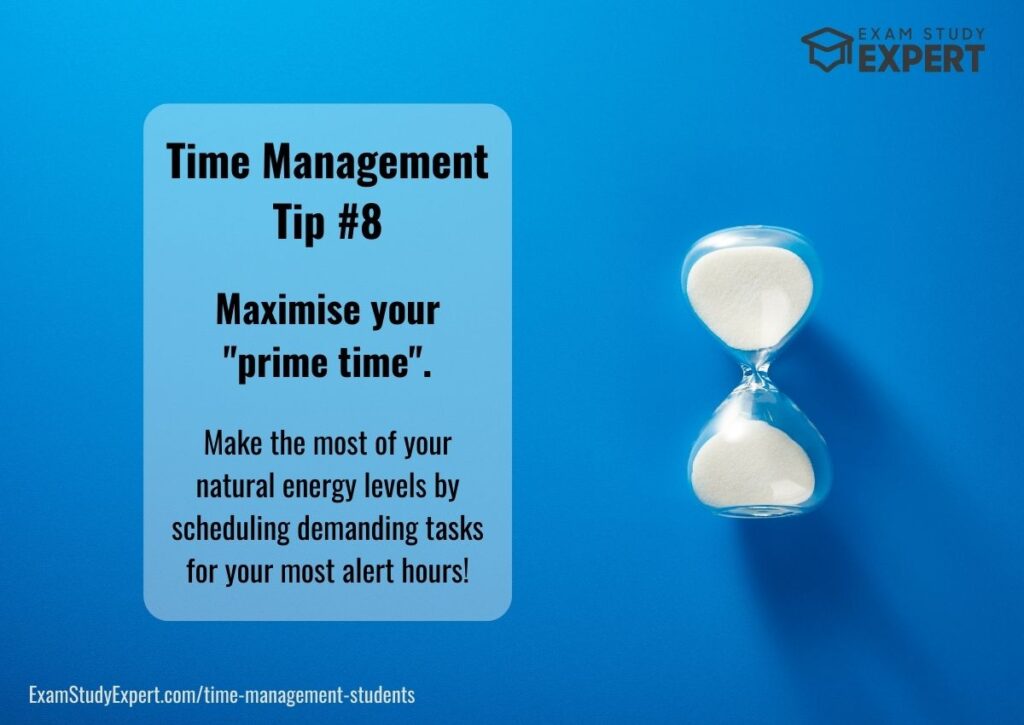
Talking of maximising your use of time, one of my favourite time management tips for students is this:
Think about when in the day you have most (and least) energy, and then match the tasks you assign to those times accordingly.
This tip makes the most of the concept called “Biological Prime Time”, a term coined by productivity expert and bestselling author of The Productivity Project and Hyperfocus Chris Bailey.
To learn more, check out episode 29 of the Exam Study Expert podcast, in which Chris and I explore the world of productivity and getting work DONE.
So, when is your “biological prime time”?
Well, that’s pretty personal, actually!
Our natural energy levels fluctuate throughout the day: you might peak around 9am for a couple of hours, or just before lunch, perhaps with a second peak later in the afternoon or early evening.
The “biological prime time” is different for everyone: pay attention to when you feel most energised and alert tomorrow, and learn when your “prime time” is.
Then, schedule your most cognitively demanding tasks accordingly: don’t waste these most valuable hours in the day on mundane stuff like filing or running errands! Get the most out of them and smash through that assignment!
Tip 7: Track & Trace
You might be surprised to discover that, no, this isn’t a National Health Service effort to track a viral pandemic. This is about tracking how you spend your time so you can trace the leaks.
What tasks are stealing your time? How can you catch them?
You can use a simple app like Toggl for this, or treat yourself to a time-turner gadget like a Timeular.
Or just keep your time tracking simple, with a spreadsheet or even a paper journal to jot down what you’re spend your time doing throughout the day.
And please don’t forget: this isn’t necessarily about using every single waking moment for work! Time you spend recharging your batteries is time well spent. Or to quote Bertrand Russell: “time you enjoy wasting is not time wasted”.
But what I do want you to watch for is how much time you spend on low-value tasks. In particular, look out for times spent procrastinating or checking emails or messages. You might be surprised how much time they consume!
Where are YOUR time thieves? And what could you do about them?
Tip 6: Cut down
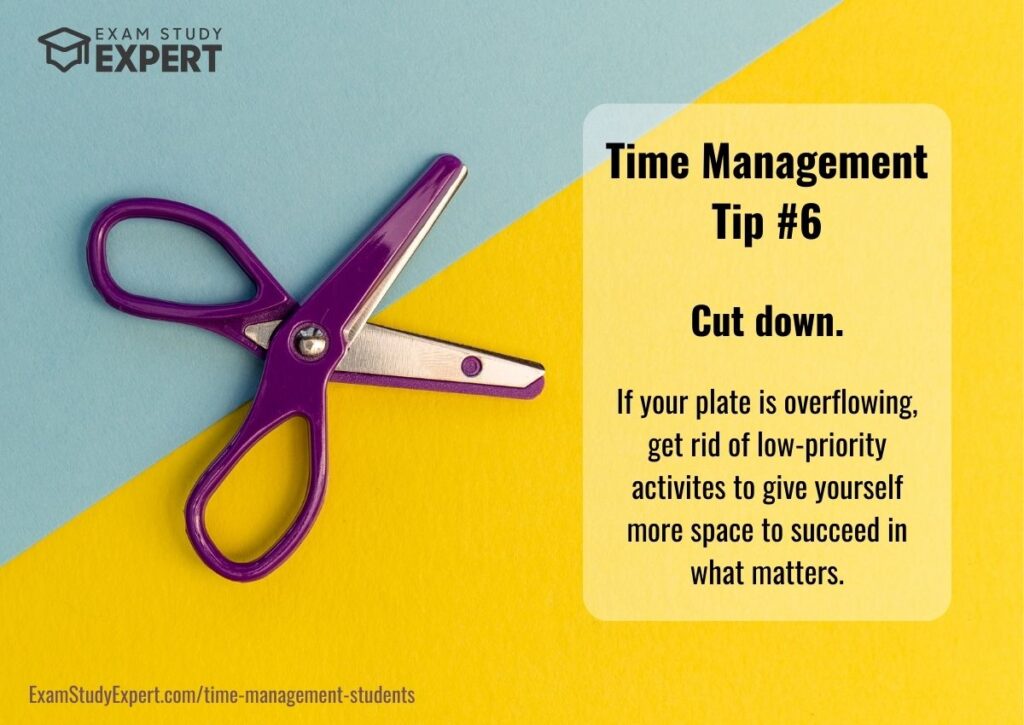
This is a simple time management strategy, and it might be one of the conclusions from the time track and trace exercise:
What can you get rid of? Is there anything you could cut from your life to help improve it?
These are often hard choices to make, sure.
But as an expert academic coach, I find that a surprisingly large number of my students say things like: “oh, I wished I’d dropped that class I just wasn’t in to”, or “I wish I had the courage to cut back on my extra-curriculars that weren’t doing anything for me”.
Yes, no-one wants to be a quitter. BUT if you’ve been having doubts for a long time and your plate is full to overflowing, getting rid of something from your schedule gives you more space to succeed in what’s left (and reduces your stress levels!).
Tip 5: Time boxing
This is a simple time management strategy, but an effective one: set hard time limits on the amount of time you spend each day on different tasks.
It’s like a to-do list, but with times against each of the actions.
Here’s an example:
- Monday: Reading, 9am to 10am. Plan introduction, 10.15am to 11am. Write introduction, 11am to 12pm.
- Tuesday: Flashcard practice, 9am to 10am. Edit introduction, 10:15am to 11:00 am … And so on.
The challenge? Sticking to those times. So make sure you know that they’re hard limits, not flexible, or else: that’s not time management any more!
This tip is a simple upgrade to your regular to-do list, but a great one for keeping you moving at the right pace through a task list or project, especially when time is limited.
Tip 4: Slice of salami, bite of cheese

This next time management tip for students comes from one of my favourite productivity authors: Brain Tracy, who is sometimes hailed as the father of time management.
You can learn more about Tracy and his winning time management strategies by listening in to our discussion in episode 39 of the Exam Study Expert podcast.
Tracy talks about contrasting project management perspectives he calls the “salami slicing” and the “Swiss cheese” approaches.
I really like this perspective because it allows you to work in a method that suits you:
- Thinking about “salami slicing” a large project means you plan to bite off chunks of the project in logical order, step 1, step 2, step 3, getting through it one slice at a time.
- Or if you prefer, going for the “Swiss cheese approach” means you start anywhere in the project, beginning middle or end, and punch a hole it wherever inspiration strikes.
As a little bonus tip, Brian Tracy is also famous for his “eat the frog” strategy (from Eat That Frog!), where you start the day with your most off-putting task and get it out the way first. It can be really effective for overcoming motivational hurdles, trust me!
Tip 3: Study routine
I love a good daily routine. So this is one of my absolute top time management tips for students.
Why?
Well, if you can get in good habits with your study schedule, it means you basically have a willpower-free way of managing your time, because you run your day on semi-autopilot, maybe with a few tweaks.
With a study routine, you can maximise your study time, energy and attention by making the most of those “biological prime time” hours we discussed in Tip #8 above.
So an effective study routine is a big win in my opinion, and it works a little like Tip #5 above.
To learn more study routine secrets, you can also check out episode 30 of the Exam Study Expert podcast, where I reveal all …
Tip 2: Theme your days
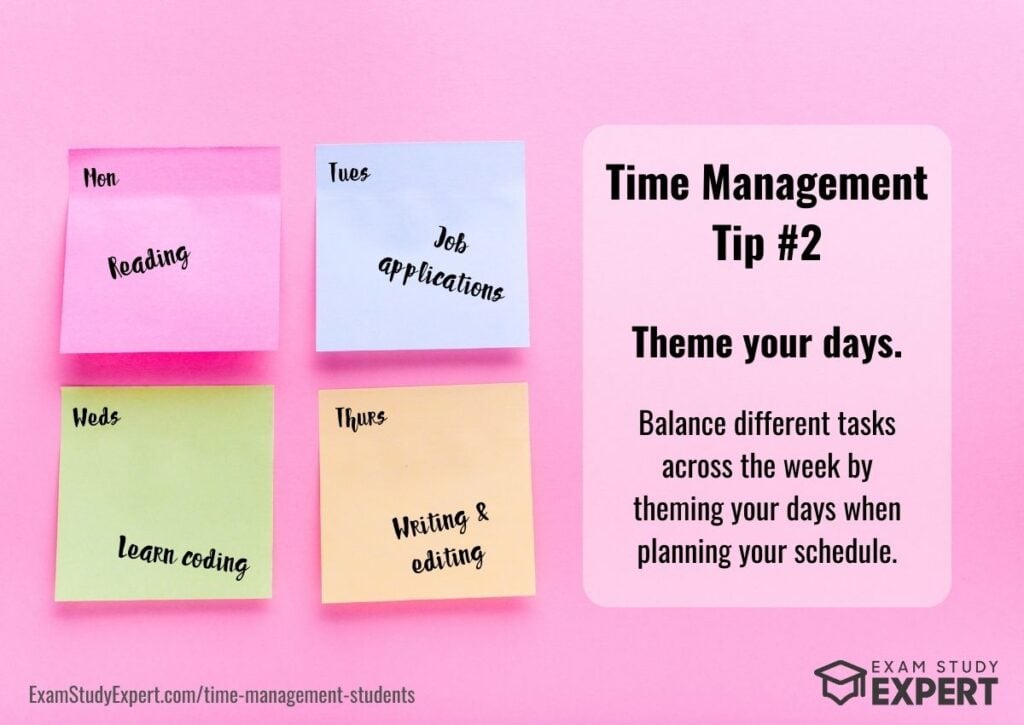
I love this time management tip because it creates balance, which is always important for students who need to maintain focus and energy!
And it’s simple: all you have to do is consider the types of tasks you have to do, and balance them out throughout your week.
Once you’ve divided your tasks into categories, assign each category a day, and then create a schedule accordingly. It might look a little like this:
- Mondays might be for reading.
- Tasks: Read 3 papers for literature review. Read the next chapter of Biology textbook, etc …
- Tuesdays might be for applying to jobs or internships.
- Tasks: Revise CV. Write 3 cover letters. Apply for 5 internships, etc …
- Wednesdays might be for teaching yourself to code.
- Thursdays might be for writing up.
- Fridays might be for editing.
Whilst this might not work throughout the academic year, sometimes you don’t need to do the same tasks every day. And this tip is a great way to create some variety.
Plus, it works equally well when planning your schedule for entire days, or if you’ve only got an hour or two left over after classes and other commitments. Your theme day approach could dictate what you do all day, or just in that hour or two each morning or night.
Tip 1: Have a plan
And my final top tip for time management for students is one that brings all of these tips together:
Whatever you do, have a plan: whether on paper, or in a digital calendar or to-do list, write it down.
Don’t carry plan around in your head – it will make you stressed, and you’re far more likely to mess up by making the wrong calls on prioritisation.
What’s more, not writing down your plan basically means you spend the whole day trying to remember what’s next, and often negotiating and re-negotiating with yourself to get it right.
So however you want to plan your time – a regular study routine, theme days, time boxing, a combination of all of these – make sure you get your intentions out of your head, and onto paper or into your Google calendar or whatever tool you’re using.
And trust me, once it’s out there on that page, it will get more manageable!
Good luck!
And so, my top 12 time management tips and hacks for students ends with a hearty good luck in all your time management endeavours!
Give these tips a go, and find the one that sticks, that works for you 😊 … and you should soon find yourself looking for more ways to streamline your studying!
And happily, I have the perfect resources to help you study smarter, starting with my science-backed handy cheat sheet. Sign up below to grab a copy and start your journey towards efficient studying today!
- [PODCAST] Peps McCrea: Hacking Study Motivation With Psychology - 27 Jan 2024
- Your Word Of The Year – Setting You Up For Success [PODCAST] - 2 Jan 2024
- Holiday Season Study Tips [PODCAST] - 21 Dec 2023




Nice work! Students of all grades and standards can utilize your information in multiple circumstances as your tips cover the solution to most of the issues students face.
No doubt! Time management is a challenge for many students. It can be difficult to juggle all the demands of school, work, and other commitments.
The first step to time management is to create a schedule. The schedule should be specific and include the time of day, how many hours you will study each day, and how long you will study for each hour.
The second step is to make sure that your schedule is realistic. This means that it should not be too ambitious or too easy.
The third step is to set deadlines for when you want to complete certain tasks. These deadlines should be reasonable but also challenging enough that they motivate you.
Also , you can use a timer, alarm clock or a time management app so that you don’t end up wasting time on things like social media and games on the internet when you’re supposed to be studying for an exam or completing an assignment.
I really enjoyed your article. Helpful tips for me. Thanks for your work.